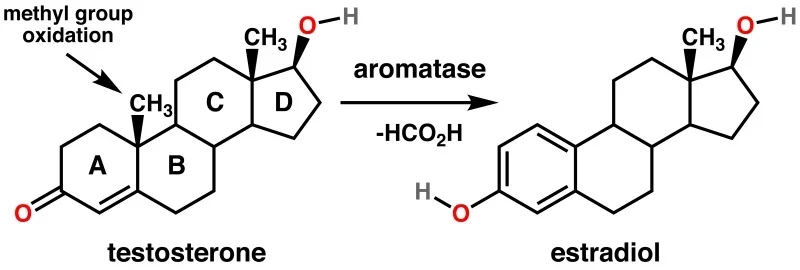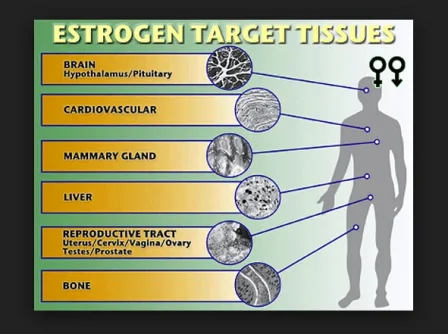Andy Peloquin
New Member

Estradiol is a very important sex hormone--in fact, it's the primary female sex hormone. It plays a central role in female reproductive health, as it promotes the development and maintenance of the ovaries, eggs, and other reproductive tissues.
The male body does produce some estradiol, though in much lower quantities than the female body, via the actions of the aromatase enzyme that converts some testosterone into estradiol. Excess or too little estradiol can have health consequences in men. These are a few of them:
It Can Cause "Man Boobs"
Men who develop "man boobs" suffer from gynecomastia, a condition where their glandular breast tissues are enlarged. The condition is the result of the body converting too much testosterone into estradiol, which in turn causes growth in glandular tissue. Testosterone replacement therapy can increase the risk of gynecomastia, particularly in men with high levels of the enzyme aromatase. This problem can be prevented with the use of an estradiol blocker (aromatase inhibitor) like anastrozole, but the dosage has to be adequate to avoid low estradiol.
It Plays a Role on Fat Mass
Testosterone is the hormone that plays a central role in the production of muscle mass, but did you know that estradiol is needed for the control of fat mass?
In one study, men with high blood testosterone levels saw a decrease in their total body fat percentage, abdominal fat specifically, and subcutaneous fat. However, the testosterone alone didn't control body fat. The men who had lower estradiol levels in their body saw an increase in total body fat, subcutaneous fat, and even the fat in their abdominal area.
This proves that estradiol hormones--specifically estradiol--play an important role in your body's ability to regulate fat mass. Blocking estradiol can have negative consequences, including weight and total body fat mass increase.
It's Vital for Sexual Health
In the same study mentioned above, the men with higher testosterone levels scored higher on sexual desire questionnaires than men with low testosterone levels. Not only that, but their erectile function was significantly better.
However, despite high testosterone levels, men with low estradiol levels still saw a decrease in their sexual desire and erectile function. If estradiol levels were over 10 pg per milliliter, sexual desire decreased by only 13%. But if estradiol levels dropped too far (to less than 10 pg per milliliter), sexual desire experienced a serious drop--by as much as 31%.
This proves that estradiol plays a central role in both sexual desire and erectile function! According to the study, "estradiol deficiency is largely responsible for some of the key consequences of male hypogonadism". If this is the case, monitoring estradiol levels could be a useful measure for assessing sexual dysfunction among men who suffer from hypogonadism (low production of testosterone).
In another study, men undergoing TRT had both their testosterone and estradiol levels measured. The men were also asked to rate their libido on a scale from 1 to 5. Those with higher testosterone and estradiol levels consistently rated their libido/sexual desire higher than those with low testosterone and estradiol levels.

It Affects Mortality Rate
Hard to believe that something as simple as a reproductive hormone can play a role in how long you live, right?
According to one study, levels of estradiol lower than 21.80 pg/ml or higher than 30.11 pg/ml increases mortality risk in men with history of heart disease with low testosterone. This is due to the fact that androgen deficiency is a common risk factor in chronic heart failure, and the too high/too low estradiol levels indicate improper androgen metabolism.
It's Necessary for Healthy Bones
Estradiol is vital for healthy bones--affecting bone loss, bone mineral density, and peak bone mass. One study examined what happens if estradiol levels fall too low, and the results were terrifying: Elderly men (between 60 and 90 years old) have a much higher chance of bone loss if estradiol levels fall too low (below 11 pg/ml).
The more estradiol available in the body, the higher the bone mineral density. The less estradiol available, the greater the bone density loss. Bone resorption markers also increased as estradiol levels plummeted. According to this study, estradiol levels that drop below 40 pg/ml may be a major cause of bone loss among men!
It Affects Hemoglobin Levels
Hemoglobin is the protein molecule in your red blood cells that transport oxygen from your lungs throughout your body. It also eliminates carbon dioxide from your body. Basically, it's one of the most important molecules in your body!
Hemoglobin production decreases with age along with hormone production. According to one study, the two are very closely linked. Of the 900 men between the ages of 70 and 81 that participated in the study, the ones with higher estradiol levels had higher hemoglobin levels. Testosterone, on the other hand, had little to no effect on the hemoglobin levels in men.
What does this mean? Simple: estradiol is a vital hormone to keep your body functioning properly as you age!
These are just a few of the studies that examine the role of estradiol on the human body, but suffice it to say, this particular estradiol is VERY important for male health. The benefits extend far beyond simple reproductive health, but plays a role in a wide range of vital bodily functions.













